Atlassian's Upside-Down Business Model
VerifiedAdded on 2020/03/07
|7
|1421
|147
AI Summary
This assignment analyzes Atlassian's innovative business model, which prioritizes creating high-quality software based on customer needs at competitive prices. It highlights the company's absence of a sales force and reliance on organic growth fueled by customer satisfaction. The analysis also explores the CAGE framework to assess potential challenges and opportunities for Atlassian's international expansion into markets like Ireland, China, and Singapore.
Contribute Materials
Your contribution can guide someone’s learning journey. Share your
documents today.
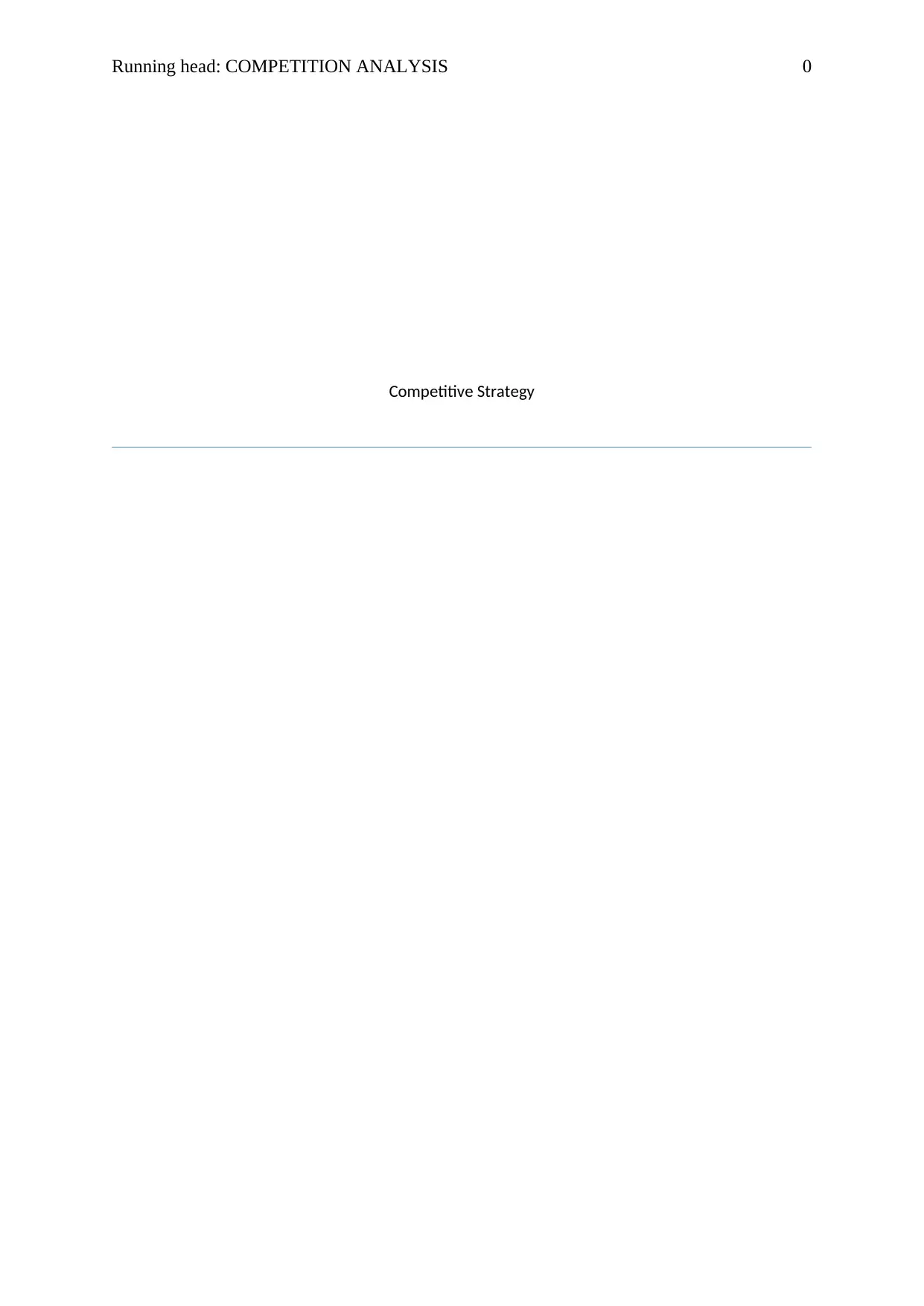
Running head: COMPETITION ANALYSIS 0
Competitive Strategy
Competitive Strategy
Secure Best Marks with AI Grader
Need help grading? Try our AI Grader for instant feedback on your assignments.
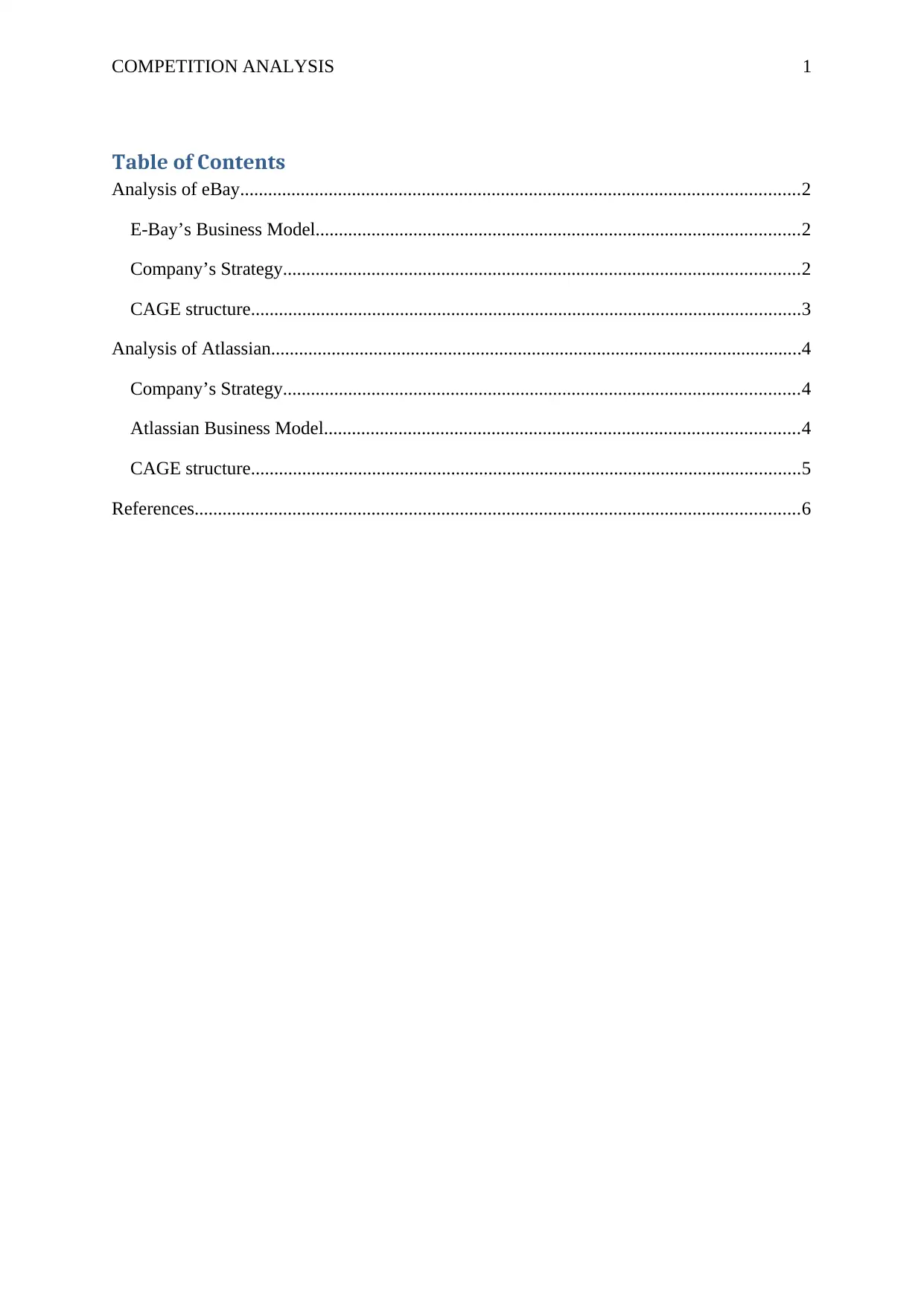
COMPETITION ANALYSIS 1
Table of Contents
Analysis of eBay........................................................................................................................2
E-Bay’s Business Model........................................................................................................2
Company’s Strategy...............................................................................................................2
CAGE structure......................................................................................................................3
Analysis of Atlassian..................................................................................................................4
Company’s Strategy...............................................................................................................4
Atlassian Business Model......................................................................................................4
CAGE structure......................................................................................................................5
References..................................................................................................................................6
Table of Contents
Analysis of eBay........................................................................................................................2
E-Bay’s Business Model........................................................................................................2
Company’s Strategy...............................................................................................................2
CAGE structure......................................................................................................................3
Analysis of Atlassian..................................................................................................................4
Company’s Strategy...............................................................................................................4
Atlassian Business Model......................................................................................................4
CAGE structure......................................................................................................................5
References..................................................................................................................................6
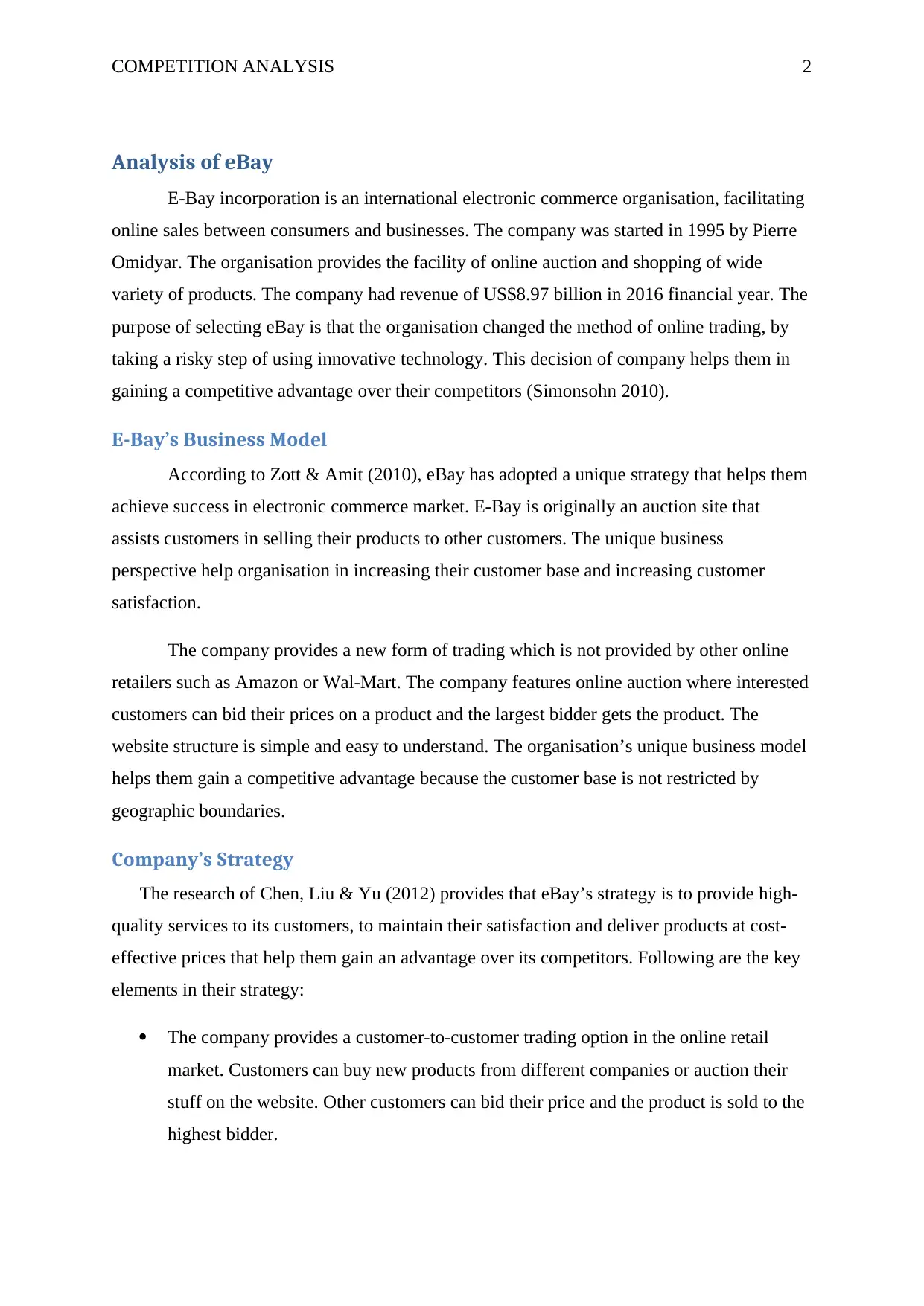
COMPETITION ANALYSIS 2
Analysis of eBay
E-Bay incorporation is an international electronic commerce organisation, facilitating
online sales between consumers and businesses. The company was started in 1995 by Pierre
Omidyar. The organisation provides the facility of online auction and shopping of wide
variety of products. The company had revenue of US$8.97 billion in 2016 financial year. The
purpose of selecting eBay is that the organisation changed the method of online trading, by
taking a risky step of using innovative technology. This decision of company helps them in
gaining a competitive advantage over their competitors (Simonsohn 2010).
E-Bay’s Business Model
According to Zott & Amit (2010), eBay has adopted a unique strategy that helps them
achieve success in electronic commerce market. E-Bay is originally an auction site that
assists customers in selling their products to other customers. The unique business
perspective help organisation in increasing their customer base and increasing customer
satisfaction.
The company provides a new form of trading which is not provided by other online
retailers such as Amazon or Wal-Mart. The company features online auction where interested
customers can bid their prices on a product and the largest bidder gets the product. The
website structure is simple and easy to understand. The organisation’s unique business model
helps them gain a competitive advantage because the customer base is not restricted by
geographic boundaries.
Company’s Strategy
The research of Chen, Liu & Yu (2012) provides that eBay’s strategy is to provide high-
quality services to its customers, to maintain their satisfaction and deliver products at cost-
effective prices that help them gain an advantage over its competitors. Following are the key
elements in their strategy:
The company provides a customer-to-customer trading option in the online retail
market. Customers can buy new products from different companies or auction their
stuff on the website. Other customers can bid their price and the product is sold to the
highest bidder.
Analysis of eBay
E-Bay incorporation is an international electronic commerce organisation, facilitating
online sales between consumers and businesses. The company was started in 1995 by Pierre
Omidyar. The organisation provides the facility of online auction and shopping of wide
variety of products. The company had revenue of US$8.97 billion in 2016 financial year. The
purpose of selecting eBay is that the organisation changed the method of online trading, by
taking a risky step of using innovative technology. This decision of company helps them in
gaining a competitive advantage over their competitors (Simonsohn 2010).
E-Bay’s Business Model
According to Zott & Amit (2010), eBay has adopted a unique strategy that helps them
achieve success in electronic commerce market. E-Bay is originally an auction site that
assists customers in selling their products to other customers. The unique business
perspective help organisation in increasing their customer base and increasing customer
satisfaction.
The company provides a new form of trading which is not provided by other online
retailers such as Amazon or Wal-Mart. The company features online auction where interested
customers can bid their prices on a product and the largest bidder gets the product. The
website structure is simple and easy to understand. The organisation’s unique business model
helps them gain a competitive advantage because the customer base is not restricted by
geographic boundaries.
Company’s Strategy
The research of Chen, Liu & Yu (2012) provides that eBay’s strategy is to provide high-
quality services to its customers, to maintain their satisfaction and deliver products at cost-
effective prices that help them gain an advantage over its competitors. Following are the key
elements in their strategy:
The company provides a customer-to-customer trading option in the online retail
market. Customers can buy new products from different companies or auction their
stuff on the website. Other customers can bid their price and the product is sold to the
highest bidder.
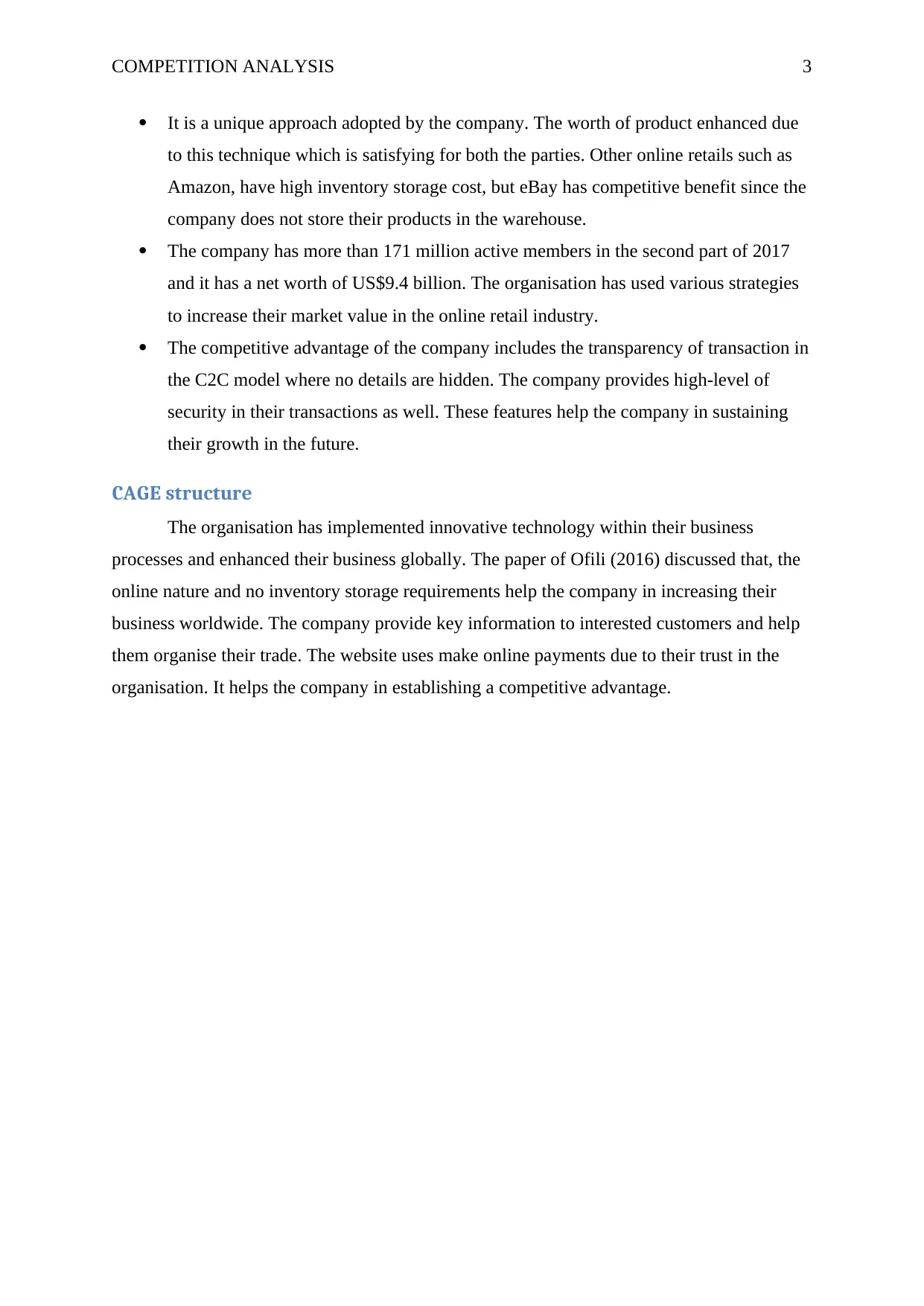
COMPETITION ANALYSIS 3
It is a unique approach adopted by the company. The worth of product enhanced due
to this technique which is satisfying for both the parties. Other online retails such as
Amazon, have high inventory storage cost, but eBay has competitive benefit since the
company does not store their products in the warehouse.
The company has more than 171 million active members in the second part of 2017
and it has a net worth of US$9.4 billion. The organisation has used various strategies
to increase their market value in the online retail industry.
The competitive advantage of the company includes the transparency of transaction in
the C2C model where no details are hidden. The company provides high-level of
security in their transactions as well. These features help the company in sustaining
their growth in the future.
CAGE structure
The organisation has implemented innovative technology within their business
processes and enhanced their business globally. The paper of Ofili (2016) discussed that, the
online nature and no inventory storage requirements help the company in increasing their
business worldwide. The company provide key information to interested customers and help
them organise their trade. The website uses make online payments due to their trust in the
organisation. It helps the company in establishing a competitive advantage.
It is a unique approach adopted by the company. The worth of product enhanced due
to this technique which is satisfying for both the parties. Other online retails such as
Amazon, have high inventory storage cost, but eBay has competitive benefit since the
company does not store their products in the warehouse.
The company has more than 171 million active members in the second part of 2017
and it has a net worth of US$9.4 billion. The organisation has used various strategies
to increase their market value in the online retail industry.
The competitive advantage of the company includes the transparency of transaction in
the C2C model where no details are hidden. The company provides high-level of
security in their transactions as well. These features help the company in sustaining
their growth in the future.
CAGE structure
The organisation has implemented innovative technology within their business
processes and enhanced their business globally. The paper of Ofili (2016) discussed that, the
online nature and no inventory storage requirements help the company in increasing their
business worldwide. The company provide key information to interested customers and help
them organise their trade. The website uses make online payments due to their trust in the
organisation. It helps the company in establishing a competitive advantage.
Secure Best Marks with AI Grader
Need help grading? Try our AI Grader for instant feedback on your assignments.
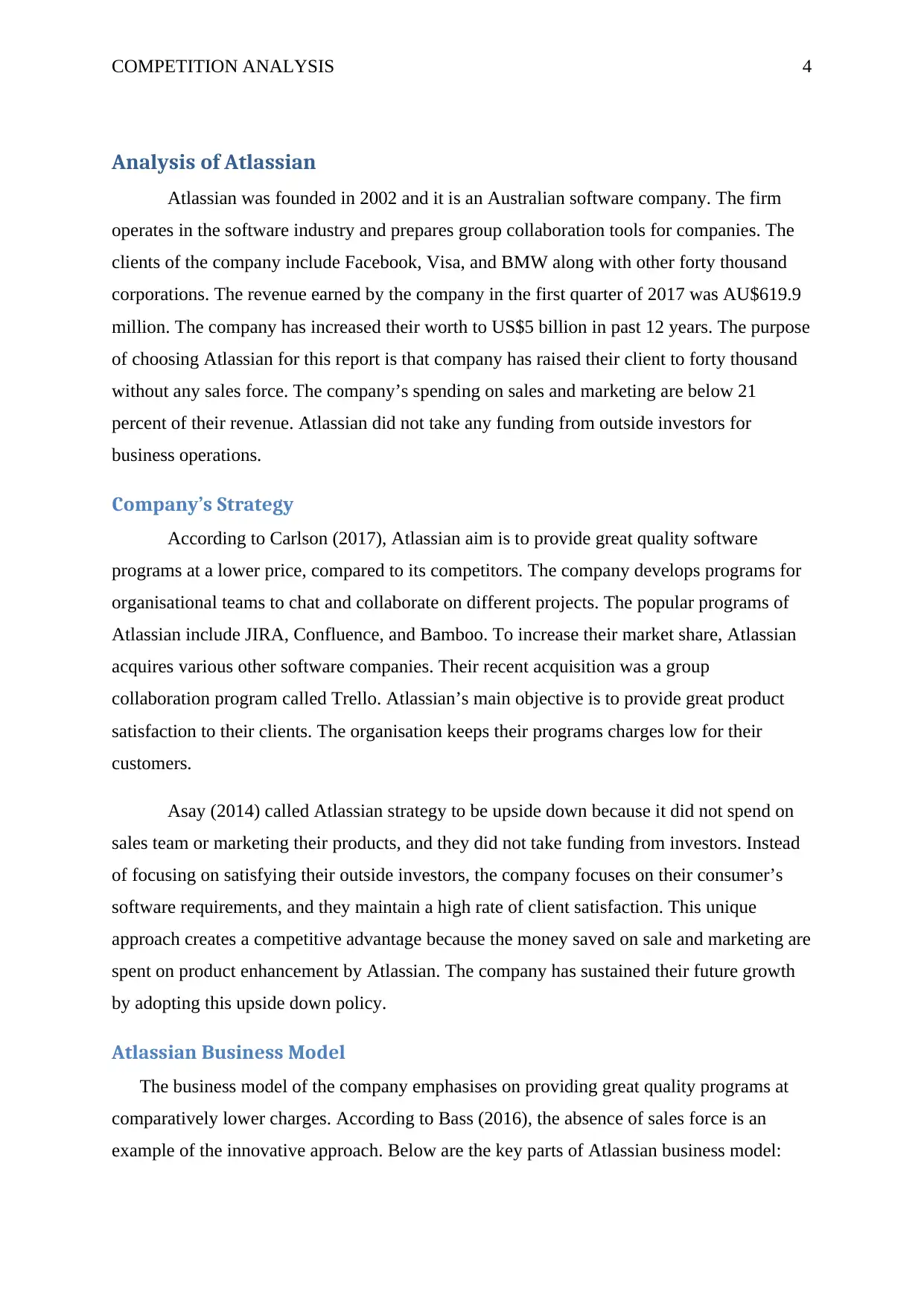
COMPETITION ANALYSIS 4
Analysis of Atlassian
Atlassian was founded in 2002 and it is an Australian software company. The firm
operates in the software industry and prepares group collaboration tools for companies. The
clients of the company include Facebook, Visa, and BMW along with other forty thousand
corporations. The revenue earned by the company in the first quarter of 2017 was AU$619.9
million. The company has increased their worth to US$5 billion in past 12 years. The purpose
of choosing Atlassian for this report is that company has raised their client to forty thousand
without any sales force. The company’s spending on sales and marketing are below 21
percent of their revenue. Atlassian did not take any funding from outside investors for
business operations.
Company’s Strategy
According to Carlson (2017), Atlassian aim is to provide great quality software
programs at a lower price, compared to its competitors. The company develops programs for
organisational teams to chat and collaborate on different projects. The popular programs of
Atlassian include JIRA, Confluence, and Bamboo. To increase their market share, Atlassian
acquires various other software companies. Their recent acquisition was a group
collaboration program called Trello. Atlassian’s main objective is to provide great product
satisfaction to their clients. The organisation keeps their programs charges low for their
customers.
Asay (2014) called Atlassian strategy to be upside down because it did not spend on
sales team or marketing their products, and they did not take funding from investors. Instead
of focusing on satisfying their outside investors, the company focuses on their consumer’s
software requirements, and they maintain a high rate of client satisfaction. This unique
approach creates a competitive advantage because the money saved on sale and marketing are
spent on product enhancement by Atlassian. The company has sustained their future growth
by adopting this upside down policy.
Atlassian Business Model
The business model of the company emphasises on providing great quality programs at
comparatively lower charges. According to Bass (2016), the absence of sales force is an
example of the innovative approach. Below are the key parts of Atlassian business model:
Analysis of Atlassian
Atlassian was founded in 2002 and it is an Australian software company. The firm
operates in the software industry and prepares group collaboration tools for companies. The
clients of the company include Facebook, Visa, and BMW along with other forty thousand
corporations. The revenue earned by the company in the first quarter of 2017 was AU$619.9
million. The company has increased their worth to US$5 billion in past 12 years. The purpose
of choosing Atlassian for this report is that company has raised their client to forty thousand
without any sales force. The company’s spending on sales and marketing are below 21
percent of their revenue. Atlassian did not take any funding from outside investors for
business operations.
Company’s Strategy
According to Carlson (2017), Atlassian aim is to provide great quality software
programs at a lower price, compared to its competitors. The company develops programs for
organisational teams to chat and collaborate on different projects. The popular programs of
Atlassian include JIRA, Confluence, and Bamboo. To increase their market share, Atlassian
acquires various other software companies. Their recent acquisition was a group
collaboration program called Trello. Atlassian’s main objective is to provide great product
satisfaction to their clients. The organisation keeps their programs charges low for their
customers.
Asay (2014) called Atlassian strategy to be upside down because it did not spend on
sales team or marketing their products, and they did not take funding from investors. Instead
of focusing on satisfying their outside investors, the company focuses on their consumer’s
software requirements, and they maintain a high rate of client satisfaction. This unique
approach creates a competitive advantage because the money saved on sale and marketing are
spent on product enhancement by Atlassian. The company has sustained their future growth
by adopting this upside down policy.
Atlassian Business Model
The business model of the company emphasises on providing great quality programs at
comparatively lower charges. According to Bass (2016), the absence of sales force is an
example of the innovative approach. Below are the key parts of Atlassian business model:
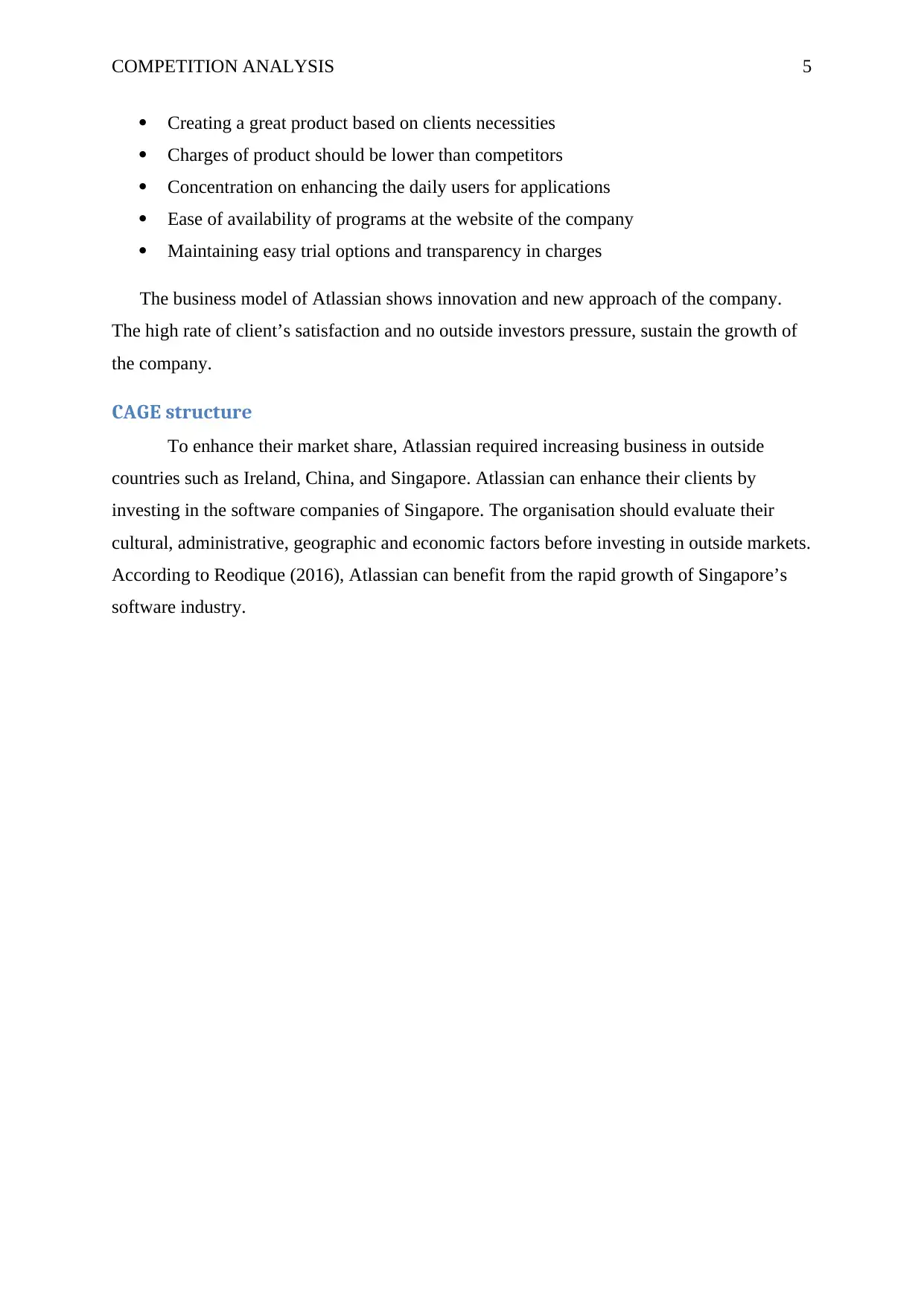
COMPETITION ANALYSIS 5
Creating a great product based on clients necessities
Charges of product should be lower than competitors
Concentration on enhancing the daily users for applications
Ease of availability of programs at the website of the company
Maintaining easy trial options and transparency in charges
The business model of Atlassian shows innovation and new approach of the company.
The high rate of client’s satisfaction and no outside investors pressure, sustain the growth of
the company.
CAGE structure
To enhance their market share, Atlassian required increasing business in outside
countries such as Ireland, China, and Singapore. Atlassian can enhance their clients by
investing in the software companies of Singapore. The organisation should evaluate their
cultural, administrative, geographic and economic factors before investing in outside markets.
According to Reodique (2016), Atlassian can benefit from the rapid growth of Singapore’s
software industry.
Creating a great product based on clients necessities
Charges of product should be lower than competitors
Concentration on enhancing the daily users for applications
Ease of availability of programs at the website of the company
Maintaining easy trial options and transparency in charges
The business model of Atlassian shows innovation and new approach of the company.
The high rate of client’s satisfaction and no outside investors pressure, sustain the growth of
the company.
CAGE structure
To enhance their market share, Atlassian required increasing business in outside
countries such as Ireland, China, and Singapore. Atlassian can enhance their clients by
investing in the software companies of Singapore. The organisation should evaluate their
cultural, administrative, geographic and economic factors before investing in outside markets.
According to Reodique (2016), Atlassian can benefit from the rapid growth of Singapore’s
software industry.
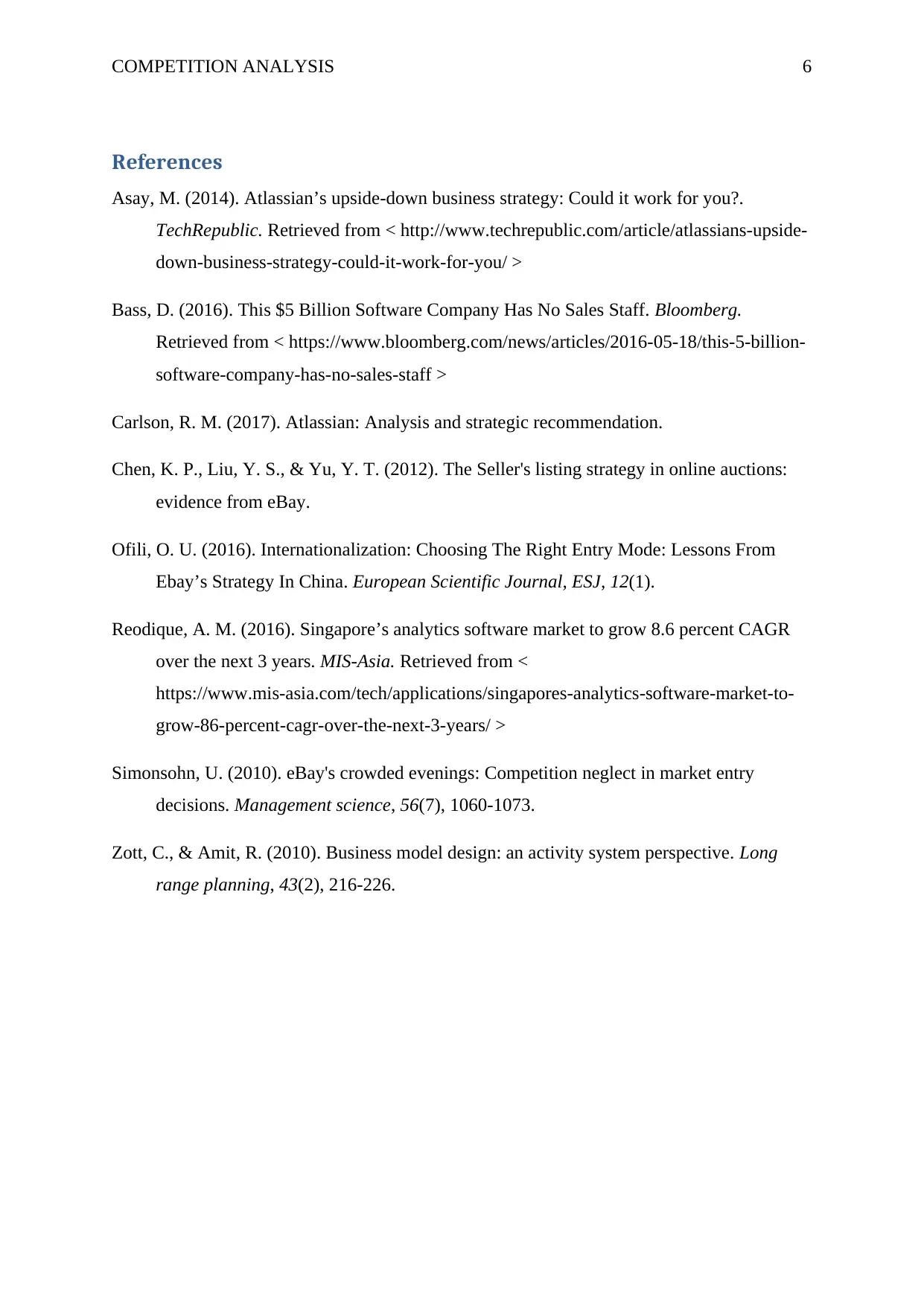
COMPETITION ANALYSIS 6
References
Asay, M. (2014). Atlassian’s upside-down business strategy: Could it work for you?.
TechRepublic. Retrieved from < http://www.techrepublic.com/article/atlassians-upside-
down-business-strategy-could-it-work-for-you/ >
Bass, D. (2016). This $5 Billion Software Company Has No Sales Staff. Bloomberg.
Retrieved from < https://www.bloomberg.com/news/articles/2016-05-18/this-5-billion-
software-company-has-no-sales-staff >
Carlson, R. M. (2017). Atlassian: Analysis and strategic recommendation.
Chen, K. P., Liu, Y. S., & Yu, Y. T. (2012). The Seller's listing strategy in online auctions:
evidence from eBay.
Ofili, O. U. (2016). Internationalization: Choosing The Right Entry Mode: Lessons From
Ebay’s Strategy In China. European Scientific Journal, ESJ, 12(1).
Reodique, A. M. (2016). Singapore’s analytics software market to grow 8.6 percent CAGR
over the next 3 years. MIS-Asia. Retrieved from <
https://www.mis-asia.com/tech/applications/singapores-analytics-software-market-to-
grow-86-percent-cagr-over-the-next-3-years/ >
Simonsohn, U. (2010). eBay's crowded evenings: Competition neglect in market entry
decisions. Management science, 56(7), 1060-1073.
Zott, C., & Amit, R. (2010). Business model design: an activity system perspective. Long
range planning, 43(2), 216-226.
References
Asay, M. (2014). Atlassian’s upside-down business strategy: Could it work for you?.
TechRepublic. Retrieved from < http://www.techrepublic.com/article/atlassians-upside-
down-business-strategy-could-it-work-for-you/ >
Bass, D. (2016). This $5 Billion Software Company Has No Sales Staff. Bloomberg.
Retrieved from < https://www.bloomberg.com/news/articles/2016-05-18/this-5-billion-
software-company-has-no-sales-staff >
Carlson, R. M. (2017). Atlassian: Analysis and strategic recommendation.
Chen, K. P., Liu, Y. S., & Yu, Y. T. (2012). The Seller's listing strategy in online auctions:
evidence from eBay.
Ofili, O. U. (2016). Internationalization: Choosing The Right Entry Mode: Lessons From
Ebay’s Strategy In China. European Scientific Journal, ESJ, 12(1).
Reodique, A. M. (2016). Singapore’s analytics software market to grow 8.6 percent CAGR
over the next 3 years. MIS-Asia. Retrieved from <
https://www.mis-asia.com/tech/applications/singapores-analytics-software-market-to-
grow-86-percent-cagr-over-the-next-3-years/ >
Simonsohn, U. (2010). eBay's crowded evenings: Competition neglect in market entry
decisions. Management science, 56(7), 1060-1073.
Zott, C., & Amit, R. (2010). Business model design: an activity system perspective. Long
range planning, 43(2), 216-226.
1 out of 7
Related Documents
Your All-in-One AI-Powered Toolkit for Academic Success.
+13062052269
info@desklib.com
Available 24*7 on WhatsApp / Email
![[object Object]](/_next/static/media/star-bottom.7253800d.svg)
Unlock your academic potential
© 2024 | Zucol Services PVT LTD | All rights reserved.





